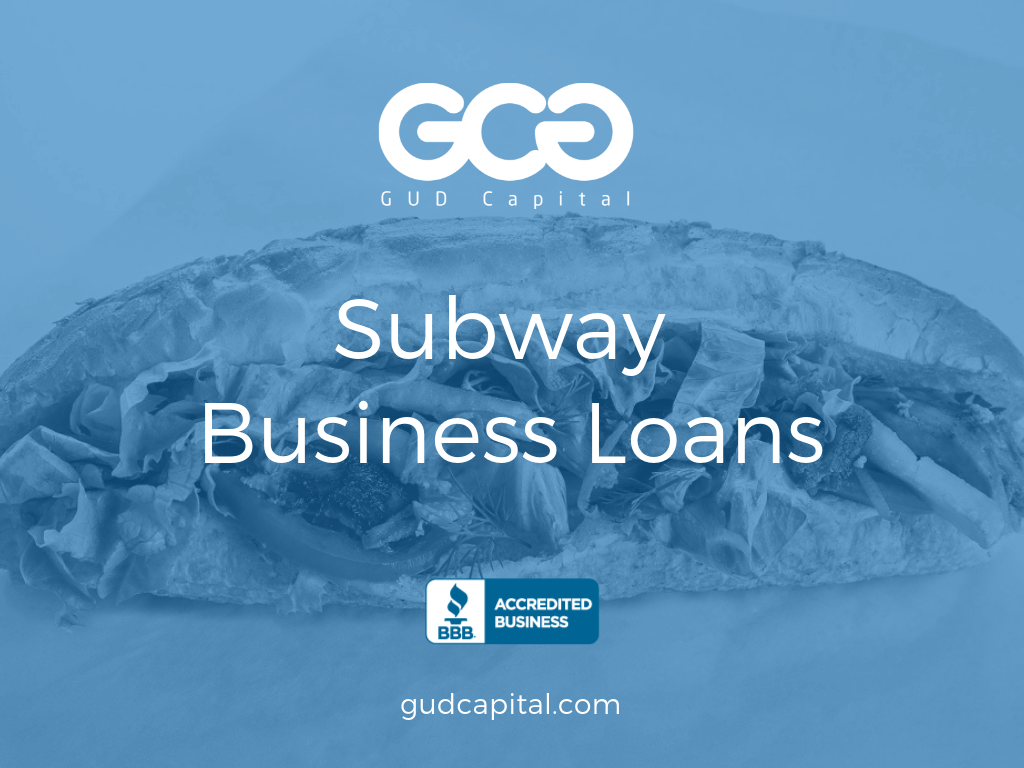Subway Business Funding
One of the most popular, lucrative, and fastest growing franchises in America is Subway. It is currently the most inquired about “how–to” open a franchise on the internet. Subway franchises were founded in 1965, and have been franchising for 45 years and are still pushing through. The fast food restaurant can be seen primarily selling submarine sandwiches, wraps, paninis, salads, breakfast sandwiches (only available in some stores), flatbread, English muffins, with add-on items such as chips, baked goods, and drinks. Today, it is franchised throughout the United States and in more than 100 countries, 42,000 stores (more than half in North America.), with locations in traditional and non-traditional places alike. Subway franchises are the largest single-brand restaurant chain and the largest restaurant establishment in the world. Thus, to franchise a Subway an initial requirement of $150,000-$328,700, a net worth requirement of $80,000-$310,000, and a liquid cash requirement of $30,000 would be needed. Also, ongoing fees include an initial franchise fee of $15,000, a royalty fee of 8%, and an ad royalty fee of 4.5%.
Quick-jump to the following sections:
- Term loans
- Secured Line of Credit
- Unsecured Line of Credit
- SBA Loans
- Alternative Loans
- Equipment Leasing
- Cash Advance
Therefore, there are several reasons why Subway franchises have captured the taste buds of consumers all around the world and have the potential to be a wise investment opportunity. One is their ability to change when needed, such as the ingredients used on their menus. Subway franchises announced in 2016 that they would be implementing a new logo and redesign, along with an updated menu as of July 2017. Calling it “Fresh Forward,” the brand now features self-order kiosks; USB charging ports at tables; and new menu items. The menu now has additional condiments, and bread made without gluten. Changing taste among consumers is the most significant push for this change in Subway establishments. Consumers want more locally sourced produce and hormone-free meat; regionally served start-ups like Sweetgreen are one of Subways biggest competitors and are one of the leading causes for their drop in sales. As follows, Subway franchises are making an effort to accommodate current consumers that are all about freshly made items at a great price. Subway has even gone so far as to invest in a $25 million re-branding campaign to target young consumers, the ones mainly pushing for more wholesome ingredients, to boost their image and sales. The new campaign includes focusing on the sourcing of Subway’s ingredients, such as phasing out antibiotic-treated meat and not celebrity endorsed products. Willing to do what it takes to grow where demand may be, Subway franchises continue to stay secure even with the changing times.
Therefore, besides market changes and upgrades to their business, Subway also offers ways to get to know their business on a more personal level—not offered at most other franchises. Subway offers regular free seminars where those interested in joining their team can meet Subway representatives and hear straight from the people involved every day. Their website also lists existing franchises that are up for sale and in great detail how to apply to become a franchisee of Subway. Once approved, the Subway training course is two weeks long and teaches business concepts, methods of operation, and necessary management skills. The time spent in the classroom for training and on-site at a local Subway franchise for hands-on experience. Once the two weeks are completed, each prospective franchisee is expected to pass an exam to become a Subway franchisee. A total of 8 to 12 employees is required to start running the Subway franchise. After the store is set up and everyone adequately trained, Subway also offers purchasing co-ops, grand opening support, and a toll-free line, field support, meetings, newsletters, and the internet. For their marketing, Subway will offer local media, national media, and other ad options to give your business much exposure.
Moreover, there are more than one type of Subway that is franchised; traditional and non-traditional full-service restaurants. Non-traditional location options include units that are full-service but are housed with another business. Locations can consist of a convenience store, gasoline stations, department stores, universities, hospitals, parks, sports arenas, airports, theme parks, military bases, and business complexes. As we can see, Subway has a diverse and wide range of locations offered for its franchisees. Lastly, Subway offers discounts and a reduced fee for people that qualify. Hence, US veterans that are eligible that purchase a Subway franchise receives a discount. They also contribute to financing $10,000 of the franchise fee if franchisees are purchasing their first franchise and they qualify under its minority loan program. A similar discount may be offered to franchisees purchasing a franchise for a low-density market. Therefore, the Subway brand is committed to operating restaurants that are environmentally and socially responsible as possible and strives to create profit for franchisees—improving the lives of customers, employees, franchisees, vendors, and communities worldwide.

Types of Subway Loans
Nearly every Subway franchise owner will seek a franchise business loan at some point in time. Some will look to the SBA to help start or purchase their franchise. Others will seek-out more alternative franchise financing to help with their operation and general franchise working capital uses. Below we will take a look at the most common types of financing available to Subway franchise owners.
Term Loans
The most common form of conventional financing for a Subway franchise is a traditional bank term loan. Term loans are used to start Subway franchises, acquisition of a franchise, commercial real estate loans, and working capital. Conventional term loans have the best rates and longest terms available for franchise owners, but to get approved you need to have great credit and a strong net worth. With that having been said, to get approved for a Subway franchise you will need the same. Therefore, if you qualify to own a Subway, you probably will qualify for a bank term loan.
| Rates | 5-15% |
|---|---|
| Terms | 1-25 years |
| Funding Amounts | $50,000-$5,000,000 |
| Collateral | Required |
| Fees | Medium costs |
Secured Line of Credit
A secured line of credit is a great form of flexible financing that allows Subway franchise owners access to preapproved financing whenever they need it without having to start a loan from the beginning. A secured line of credit is collateralized against the franchise’s assets, and may be adjusted periodically depending upon what the company’s financial statements show.
| Rates | 5-15% |
|---|---|
| Terms | 1-2 years |
| Funding Amounts | $10,000-$5,000,000 |
| Collateral | A/R Required |
| Fees | Medium costs |
Unsecured Line of Credit
An unsecured line of credit for Subway franchises works a lot like a secured line of credit, in that they are both a form of pre-approved financing that allows the franchisee to access cash whenever they need it. The difference is that with an unsecured line of credit there isn’t a requirement for the line of credit be collateralized against business assets. Therefore, to qualify the business owner must have a very strong credit score.
| Rates | 0% for 12 months |
|---|---|
| Terms | 1-2 years |
| Funding Amounts | $10,000-$500,000 |
| Collateral | Not be Required |
| Fees | Medium costs |
SBA Loans
SBA loans are a common financing tool for franchise owners – especially at the startup stage. SBA loans are nothing more than conventional loans, but the difference between a SBA 7(a) enhanced loan and a conventional loan is that the lender isn’t exposed to much risk because the U.S. Small Business Administration agrees to cover most of the SBA franchise lender’s losses if the franchisee fails to fully-repay the loan.
| Rates | 5-8% |
|---|---|
| Terms | 3-25 years |
| Funding Amounts | $50,000-$5,000,000 |
| Collateral | Required |
| Fees | Medium costs |
Alternative Loans
Alternative business loans are used by Subway franchise owners who need fast access to capital without the long approval process that they’d face if seeking a bank loan. Alternative loans require minimal business paperwork and documentation, and can be approved and funded within as little as 5 business days.
| Rates | 8-25% |
|---|---|
| Terms | 1-5 years |
| Funding Amounts | $10,000-$500,000 |
| Collateral | Not required |
| Fees | Medium costs |
Equipment Leasing
Equipment leasing is an alternative financing for franchise owners seeking new equipment, but don’t want to pay the full-cost of the equipment upfront. With equipment leasing, the Subway franchise owner only needs to pay 10% of the costs down, and then can make monthly payments over a period of time until the end of the lease, when they will then be provided the option of extending the term, purchasing the equipment, or returning the business equipment.
| Rates | 0.5-2.5% |
|---|---|
| Terms | 1-10 years |
| Funding Amounts | $10,000-$5,000,000 |
| Collateral | Required |
| Fees | Medium costs |
Cash Advance
A franchise cash advance is a way for any business to obtain financing for emergency uses in as little as a few hours. Unlike a loan, a cash advance is the sale of the Subway franchise’s future revenue at a discount, in order to obtain immediate financing. The amount of funding a Subway franchise will qualify for depends upon the monthly cash-flow into the business bank account, or by monthly credit card sales.
| Factor rates | 1.10 – 1.50 |
|---|---|
| Terms | 3-24 months |
| Funding Amounts | $5,000-$2,000,000 |
| Collateral | Not required |
| Fees | Low to High costs |
Summary
Getting approved for a franchise business loan isn’t difficult for owners of Subway franchises, because many of the requirements needed to open or purchase your franchise, will be the same requirements required by lenders. The key is finding the right lender that best fits your business needs. If you are a Subway franchise owner/operator and looking for financing, please reach-out to one of our financing specialists and we’ll help you navigate the process.
[wp-review id=”100676″]





















